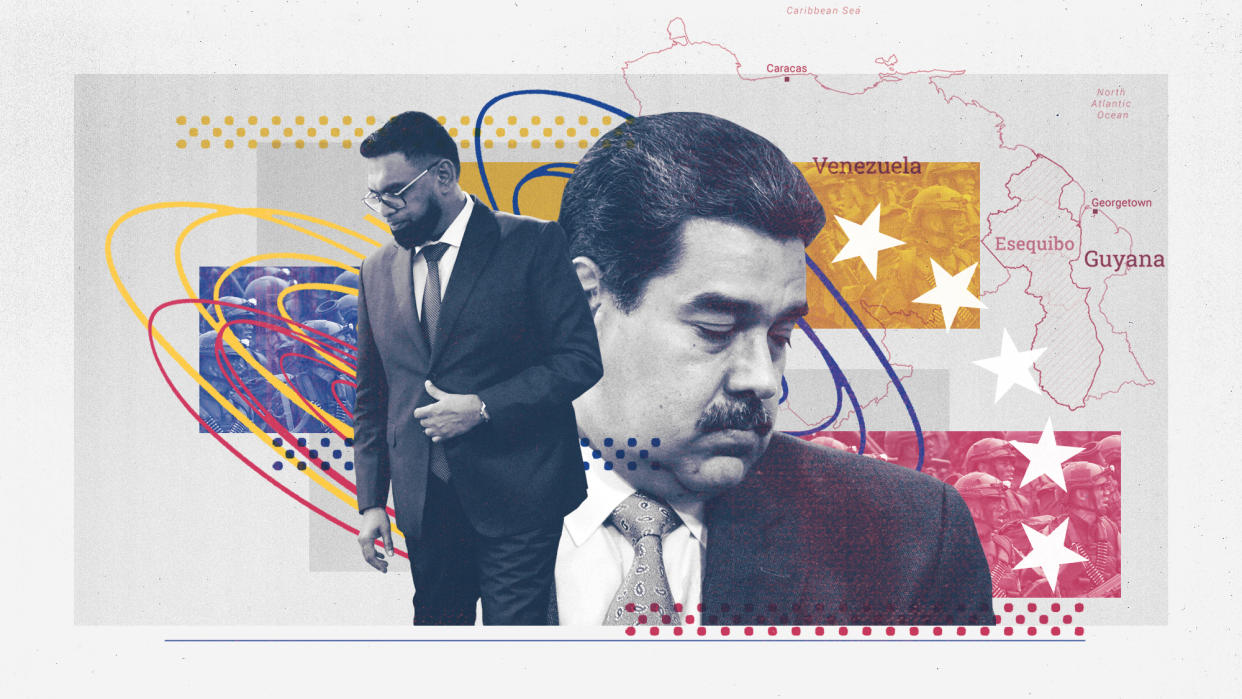Is Venezuela about to start a war in Latin America?

- Oops!Something went wrong.Please try again later.
- Oops!Something went wrong.Please try again later.
Is a threat by Venezuelan leader Nicolas Maduro to annex Guyana's oil fields a prelude to war in Latin America? Or is the strongman merely trying to rally his own nation ahead of a presidential election next year? No one really knows for sure, The Miami Herald reports, but American officials are "increasingly concerned over how far Nicolas Maduro may be willing to go."
Maduro's claim over the Essequibo region of Guyana "would give Caracas a claim to offshore oil riches that Guyana recently found and that Venezuela clearly covets," Alexandra Sharp explained at Foreign Policy. A weekend referendum in Venezuela supposedly received the backing of 95 percent of voters in favor of annexation, though it's important to note the government this week also ordered the mass arrest of annexation opponents. Maduro's aim in all of this is to "give him a claim to big oil, bolster support for his United Socialist Party, and pigeonhole the opposition into appearing anti-patriotic."
It's a threat that leaders across the Western Hemisphere are taking seriously. Irfaan Ali, president of Guyana, told The Associated Press his country is preparing to defend itself. "We take this threat very seriously, and we have initiated a number of precautionary measures to ensure the peace and stability of this region," he said. And the U.S. is weighing in: Secretary of State Antony Blinken called Ali to offer America's "unwavering support for Guyana's sovereignty."
What the commentators said
"The norm that borders cannot be changed through military force now faces its first major test in this hemisphere in generations," Ben Rowswell, who previously served as Canada's ambassador to Venezuela argued in The Globe and Mail. But Maduro "has made a career of breaking norms" — incarcerating opponents, subverting elections and suspending the country's constitution. While control of Essequibo has been disputed for more than a century, there's no real question that the territory belongs to Guyana. "We cannot accept a potential invasion."
With wars raging in Ukraine and Gaza, it's clear "President Biden does not want a dispute with Mr. Maduro now," The Washington Post editorialized. But Maduro's threat comes on the heels of his failure to make good on promises to hold a free presidential election and to release U.S. citizens improperly held by his government. (The U.S. dropped longstanding sanctions on Venezuela in exchange for those promises.) America "needs to respond with sanctions that squeeze Mr. Maduro and his gang, who have driven Venezuela to ruin."
The presidential election is the point, El País editorialized. A potential conflict with Guyana gives Maduro "the perfect excuse to declare 'internal commotion' and postpone the elections indefinitely." Maduro called the referendum on Essequibo the day after María Corina Machado overwhelmingly won the opposition primary election to oppose him. His party "has used the territorial conflict to stir up the specter of internal conspiracy" and cast Machado as the source of strife. The threat to Guyana is also a "threat to a fair electoral process."
What next?
Tensions are rising in the region. Brazil — which borders both Venezuela and Guyana to the south — this week announced that it is deploying troops along its border. "If there's one thing we don't want here in South America it's war," Brazilian President Luiz Inacio Lula da Silva told a summit of South American officials this week. "We don't need conflict. We need to build peace."
The American military is also getting involved. CBS News reported that the Defense Department will conduct "joint military flight drills" with Guyana in order to "strengthen regional cooperation." "The U.S. will continue its commitment as Guyana's trusted security partner and promoting regional cooperation and interoperability," the department said in a statement. And diplomats are hard at work: The United Nations Security Council scheduled an emergency session on the issue for Friday.

